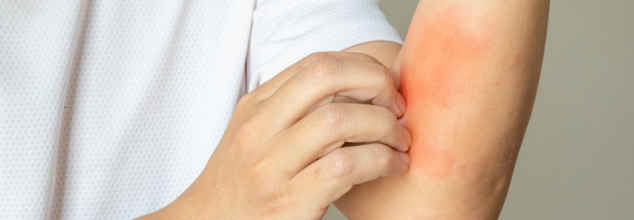
Why Do We Scratch An Itch When We Know It Hurts?
Scratching an itch can be really satisfying but also annoying at times. You often find yourself mindlessly scratching your arms or whatever skin is exposed as these are the places mosquitos commonly bite. While this is may not be a significant activity, it is when you catch an infection or start feeling itchy because of any allergen, it can become difficult to navigate. Many people even hurt themselves while itching because, even though it hurts, the itch needs to be scratched otherwise it will drive you crazy! Doctors often advise people not to scratch wounds and inflamed areas as it can become worse and infect existing wounds.
A recent study published in the Science Journal has revealed something interesting. The itch-scratch cycle is very fundamental in allergic dermatitis and arthropod reactions, in which itching and scratching feed back into the cycle and enhance inflammation to worsen the disease. Such research underlines the evolutionary aspect of scratching by serving a purpose through a neuroimmune axis despite its pathogenic nature. It reconciles apparently paradoxical properties of scratching by considering both roles of scratching—pathological and potential adaptive responses.
Scratching an itch is something we all do, but it turns out there's more to it than just habit. New research shows that scratching is actually a complex process with both positive and negative effects. While it can make skin inflammation worse, it also helps the body fight off infections by bringing immune cells to the skin's surface. This discovery helps explain why we scratch and offers hope for better treatments for chronic itch or skin conditions. It's a bit of a puzzle: how can something which is bad for your skin actually be helpful? This research helps us understand that paradox.
Why Do We Always Scratch An Itch?
When something itches, our natural reaction is to scratch. This is especially true with skin conditions like dermatitis or bug bites. The problem is that scratching often makes things worse, creating a vicious cycle- the more you scratch, the more inflamed your skin gets, and the itchier you feel. This "itch-scratch cycle" can be really hard to break. It's not like pain, which usually stops us from doing something that hurts. Scratching, even though it can be damaging in the long run, often feels good in the moment, which makes it hard to resist.
What Happens When You Scratch Your Skin?
Scientists wanted to understand exactly what happens when we scratch. Researchers used special mice to study how certain nerve cells that sense itching, called NP2 neurons, affect inflammation. They found that scratching activates pain-sensing nerves. These nerves then release a chemical called substance P (SP). SP then triggers immune cells called mast cells. These mast cells release other chemicals that attract white blood cells to the area, causing inflammation. So, scratching sets off a chain reaction that leads to inflammation.
Surprising Benefits of Scratching
Even though scratching can worsen skin conditions like dermatitis, it also has a surprising benefit: it helps the body fight infections. It seems that scratching can help reduce the amount of harmful bacteria, like Staphylococcus aureus, at the site of an injury. It might even play a role in balancing the skin's microbiome – the community of microorganisms living on our skin. However, this is a complex relationship, especially for people with chronic skin conditions like eczema, where scratching can disrupt the microbiome and worsen the condition.
Reasons Why An Itch Could Be Sign Of An Underlying Disease
According to Cleveland Clinic, where and when the itch is happening does matter in understanding whether it is an issue if not. Some people itch even when they are asleep and there have been cases of people itching themselves till they draw blood even in their sleep. A 2019 study done by the American Academy of Dermatology concluded that itching related to a liver disease starts at the palm of your hand and spreads, similarly and iron deficiency or anemia related itch could develop as red and bumpy skin that feels sore when you scratch it, it is called an anemia rash. Any itch that persists for a long time should be checked out by a doctor.
This new research suggests that scratching isn't just a bad habit; it's actually an ancient defense mechanism that evolved to protect us from infection. While it can be harmful in some situations, it also plays a role in our immune system's response to injury. Scientists believe that understanding this complex process could lead to new and better treatments for chronic itching.
© 2024 Bennett, Coleman & Company Limited

